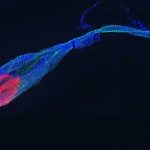Link to Pubmed [PMID] – 19019159
Mol. Microbiol. 2008 Dec;70(6):1342-57
DegU is considered to be an orphan response regulator in Listeria monocytogenes since the gene encoding the cognate histidine kinase DegS is absent from the genome. We have previously shown that DegU is involved in motility, chemotaxis and biofilm formation and contributes to L. monocytogenes virulence. Here, we have investigated the role of DegU phosphorylation in Listeria and shown that DegS of Bacillus subtilis can phosphorylate DegU of L. monocytogenes in vitro. We introduced the B. subtilis degS gene into L. monocytogenes, and showed that this leads to highly increased expression of motility and chemotaxis genes, in a DegU-dependent fashion. We inactivated the predicted phosphorylation site of DegU by replacing aspartate residue 55 with asparagine and showed that this modified protein (DegU(D55N)) is no longer phosphorylated by DegS in vitro. We show that although the unphosphorylated form of DegU retains much of its activity in vivo, expression of motility and chemotaxis genes is lowered in the degU(D55N) mutant. We also show that the small-molecular-weight metabolite acetyl phosphate is an efficient phosphodonor for DegU in vitro and our evidence suggests this is also true in vivo. Indeed, a L. monocytogenesDeltaptaDeltaackA mutant that can no longer synthesize acetyl phosphate was found to be strongly affected in chemotaxis and motility gene expression and biofilm formation. Our findings suggest that phosphorylation by acetyl phosphate could play an important role in modulating DegU activity in vivo, linking its phosphorylation state to the metabolic status of L. monocytogenes.

